Mental Health Nursing: Assessment and Recovery Care Plan Report
VerifiedAdded on 2023/01/09
|11
|3541
|92
Report
AI Summary
This report provides a mental health nursing assessment and recovery plan for a patient, Mrs. X, suffering from depression, HIV, and hepatitis C virus. The assignment begins with an introduction to mental health and the patient's case, followed by a detailed mental status assessment exploring ten broad areas: level of consciousness, general appearance, behavior, mood & affect, speech, thought, intellectual performance, perception, judgment, and insight. The assessment utilizes clinical assessment methods of communication, observation, and active listening to gather information. The second section focuses on a recovery-focused care plan, outlining two MH nursing interventions based on the CHIME framework of recovery. These interventions emphasize rest, relaxation, addressing the patient's feelings related to her mother's death, counseling, medication adherence, and cognitive behavioral therapy. The report aims to guide the patient's recovery through a structured approach, considering both the patient's physical and mental health needs.
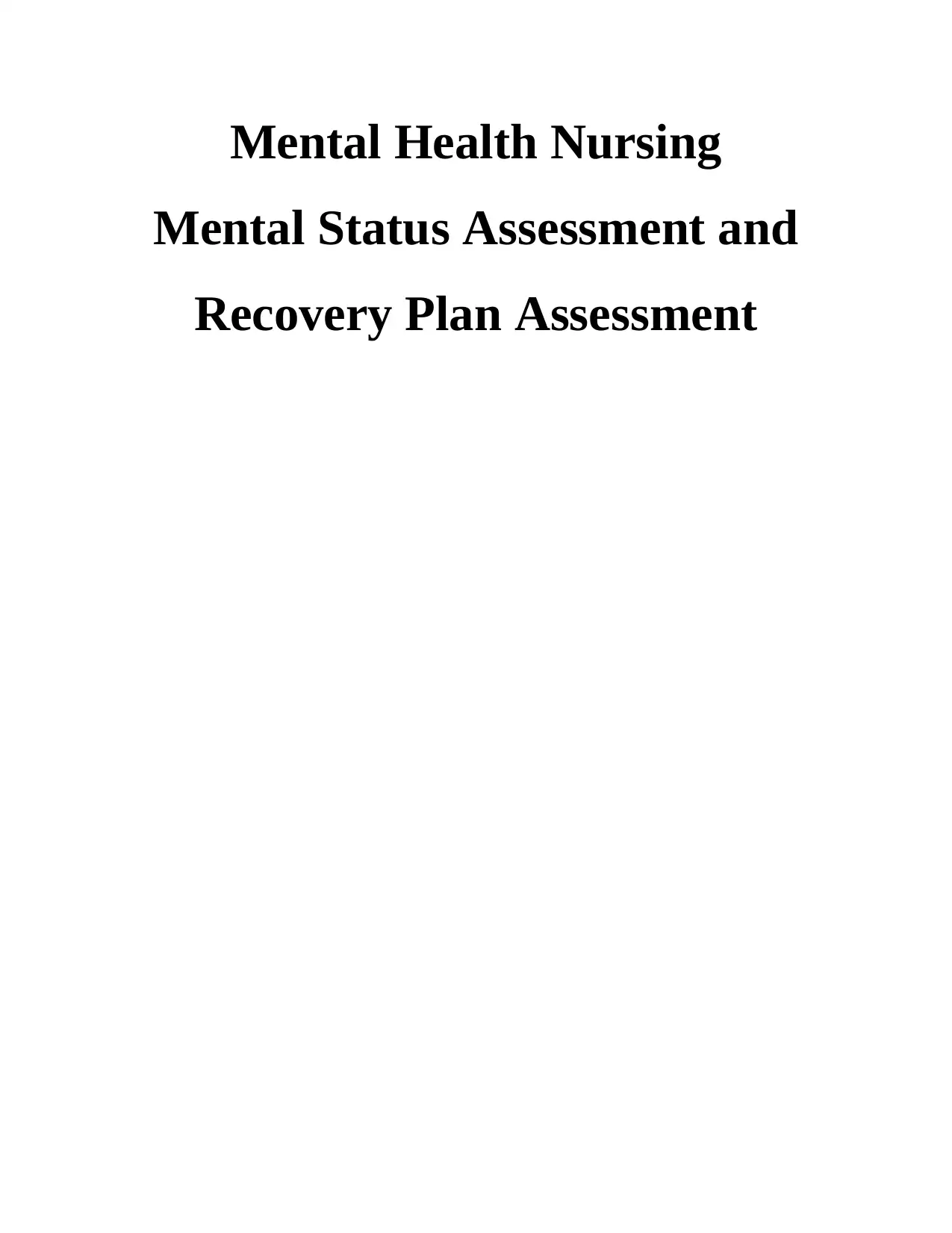
Mental Health Nursing
Mental Status Assessment and
Recovery Plan Assessment
Mental Status Assessment and
Recovery Plan Assessment
Paraphrase This Document
Need a fresh take? Get an instant paraphrase of this document with our AI Paraphraser
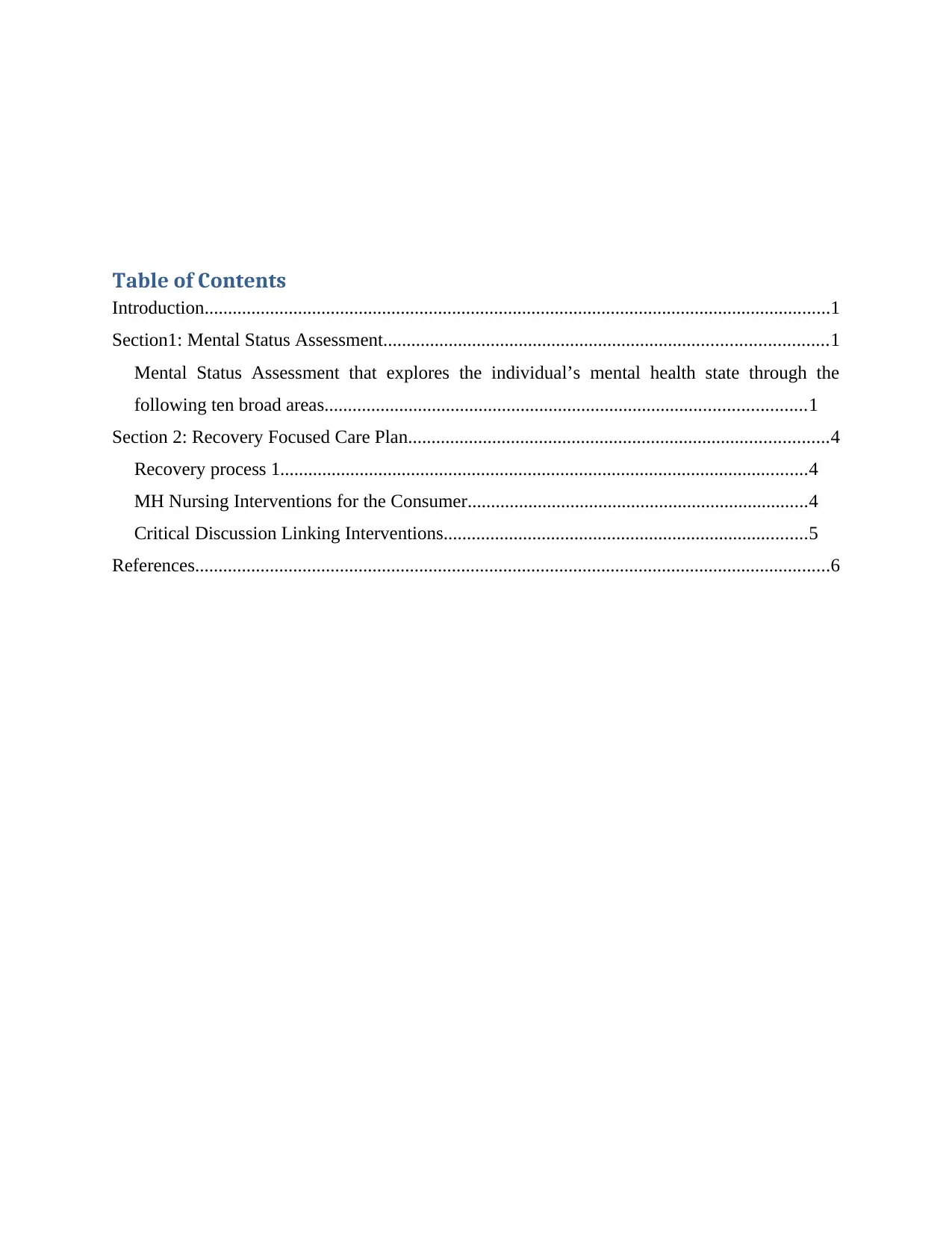
Table of Contents
Introduction......................................................................................................................................1
Section1: Mental Status Assessment...............................................................................................1
Mental Status Assessment that explores the individual’s mental health state through the
following ten broad areas.......................................................................................................1
Section 2: Recovery Focused Care Plan..........................................................................................4
Recovery process 1.................................................................................................................4
MH Nursing Interventions for the Consumer.........................................................................4
Critical Discussion Linking Interventions..............................................................................5
References........................................................................................................................................6
Introduction......................................................................................................................................1
Section1: Mental Status Assessment...............................................................................................1
Mental Status Assessment that explores the individual’s mental health state through the
following ten broad areas.......................................................................................................1
Section 2: Recovery Focused Care Plan..........................................................................................4
Recovery process 1.................................................................................................................4
MH Nursing Interventions for the Consumer.........................................................................4
Critical Discussion Linking Interventions..............................................................................5
References........................................................................................................................................6
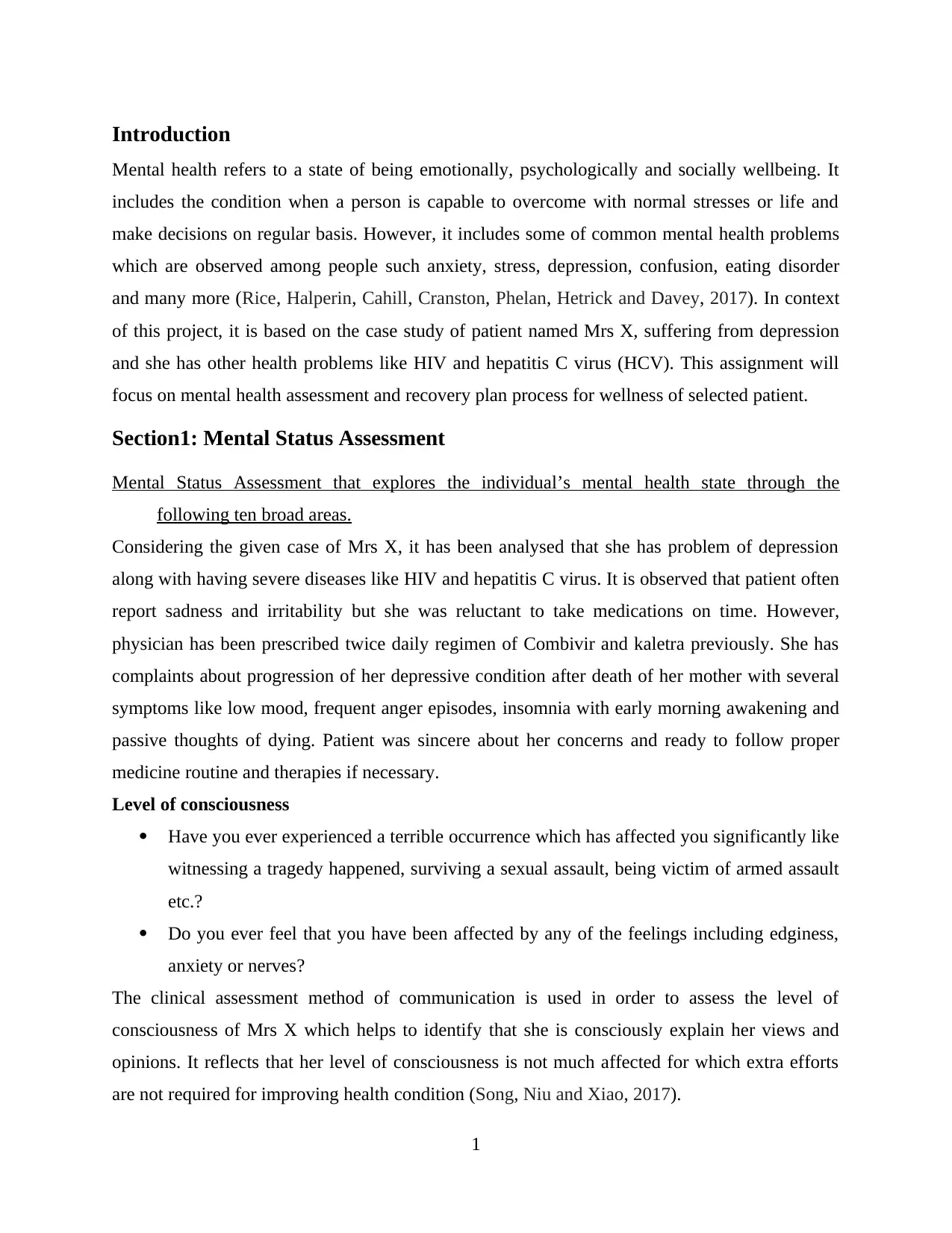
Introduction
Mental health refers to a state of being emotionally, psychologically and socially wellbeing. It
includes the condition when a person is capable to overcome with normal stresses or life and
make decisions on regular basis. However, it includes some of common mental health problems
which are observed among people such anxiety, stress, depression, confusion, eating disorder
and many more (Rice, Halperin, Cahill, Cranston, Phelan, Hetrick and Davey, 2017). In context
of this project, it is based on the case study of patient named Mrs X, suffering from depression
and she has other health problems like HIV and hepatitis C virus (HCV). This assignment will
focus on mental health assessment and recovery plan process for wellness of selected patient.
Section1: Mental Status Assessment
Mental Status Assessment that explores the individual’s mental health state through the
following ten broad areas.
Considering the given case of Mrs X, it has been analysed that she has problem of depression
along with having severe diseases like HIV and hepatitis C virus. It is observed that patient often
report sadness and irritability but she was reluctant to take medications on time. However,
physician has been prescribed twice daily regimen of Combivir and kaletra previously. She has
complaints about progression of her depressive condition after death of her mother with several
symptoms like low mood, frequent anger episodes, insomnia with early morning awakening and
passive thoughts of dying. Patient was sincere about her concerns and ready to follow proper
medicine routine and therapies if necessary.
Level of consciousness
Have you ever experienced a terrible occurrence which has affected you significantly like
witnessing a tragedy happened, surviving a sexual assault, being victim of armed assault
etc.?
Do you ever feel that you have been affected by any of the feelings including edginess,
anxiety or nerves?
The clinical assessment method of communication is used in order to assess the level of
consciousness of Mrs X which helps to identify that she is consciously explain her views and
opinions. It reflects that her level of consciousness is not much affected for which extra efforts
are not required for improving health condition (Song, Niu and Xiao, 2017).
1
Mental health refers to a state of being emotionally, psychologically and socially wellbeing. It
includes the condition when a person is capable to overcome with normal stresses or life and
make decisions on regular basis. However, it includes some of common mental health problems
which are observed among people such anxiety, stress, depression, confusion, eating disorder
and many more (Rice, Halperin, Cahill, Cranston, Phelan, Hetrick and Davey, 2017). In context
of this project, it is based on the case study of patient named Mrs X, suffering from depression
and she has other health problems like HIV and hepatitis C virus (HCV). This assignment will
focus on mental health assessment and recovery plan process for wellness of selected patient.
Section1: Mental Status Assessment
Mental Status Assessment that explores the individual’s mental health state through the
following ten broad areas.
Considering the given case of Mrs X, it has been analysed that she has problem of depression
along with having severe diseases like HIV and hepatitis C virus. It is observed that patient often
report sadness and irritability but she was reluctant to take medications on time. However,
physician has been prescribed twice daily regimen of Combivir and kaletra previously. She has
complaints about progression of her depressive condition after death of her mother with several
symptoms like low mood, frequent anger episodes, insomnia with early morning awakening and
passive thoughts of dying. Patient was sincere about her concerns and ready to follow proper
medicine routine and therapies if necessary.
Level of consciousness
Have you ever experienced a terrible occurrence which has affected you significantly like
witnessing a tragedy happened, surviving a sexual assault, being victim of armed assault
etc.?
Do you ever feel that you have been affected by any of the feelings including edginess,
anxiety or nerves?
The clinical assessment method of communication is used in order to assess the level of
consciousness of Mrs X which helps to identify that she is consciously explain her views and
opinions. It reflects that her level of consciousness is not much affected for which extra efforts
are not required for improving health condition (Song, Niu and Xiao, 2017).
1
⊘ This is a preview!⊘
Do you want full access?
Subscribe today to unlock all pages.

Trusted by 1+ million students worldwide
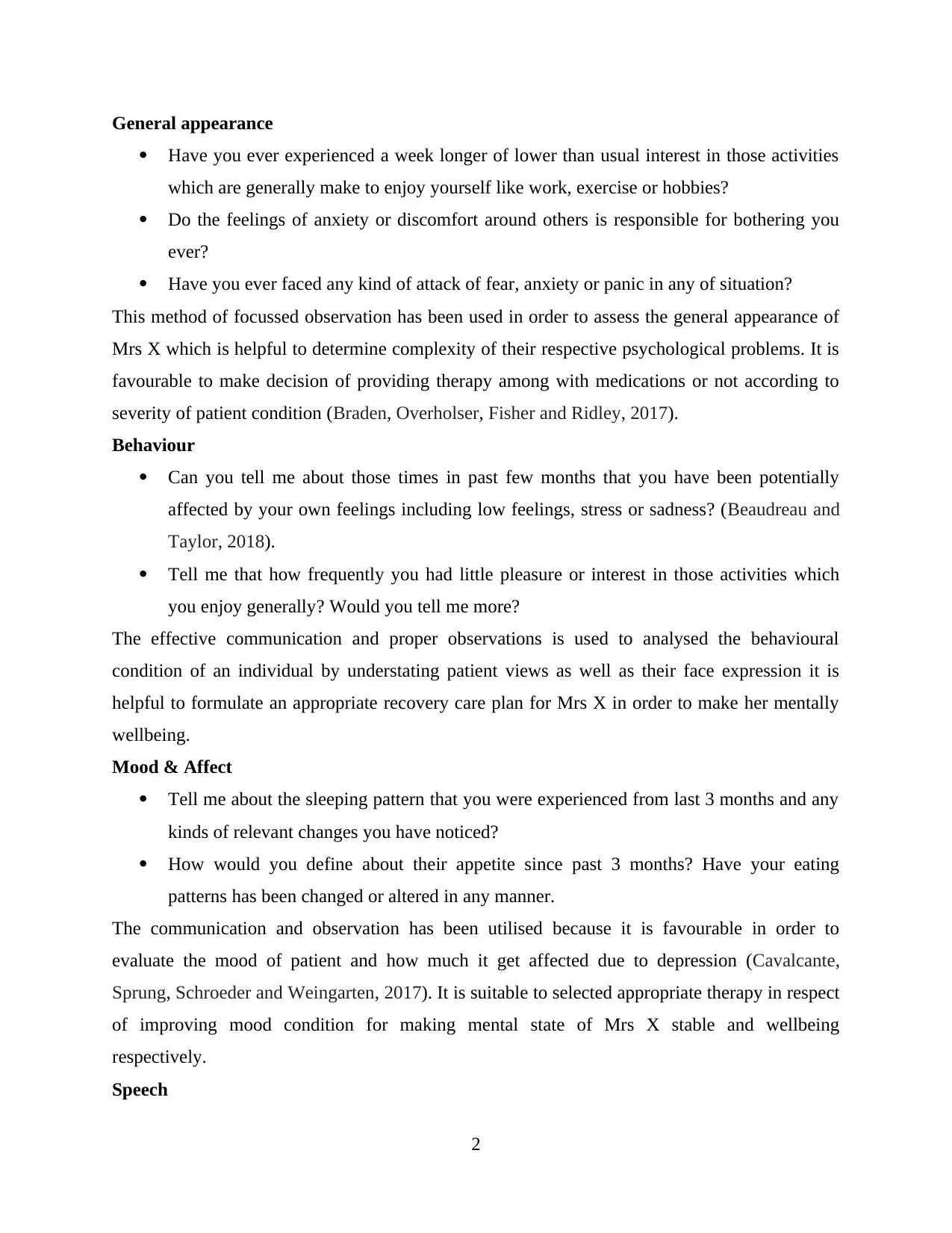
General appearance
Have you ever experienced a week longer of lower than usual interest in those activities
which are generally make to enjoy yourself like work, exercise or hobbies?
Do the feelings of anxiety or discomfort around others is responsible for bothering you
ever?
Have you ever faced any kind of attack of fear, anxiety or panic in any of situation?
This method of focussed observation has been used in order to assess the general appearance of
Mrs X which is helpful to determine complexity of their respective psychological problems. It is
favourable to make decision of providing therapy among with medications or not according to
severity of patient condition (Braden, Overholser, Fisher and Ridley, 2017).
Behaviour
Can you tell me about those times in past few months that you have been potentially
affected by your own feelings including low feelings, stress or sadness? (Beaudreau and
Taylor, 2018).
Tell me that how frequently you had little pleasure or interest in those activities which
you enjoy generally? Would you tell me more?
The effective communication and proper observations is used to analysed the behavioural
condition of an individual by understating patient views as well as their face expression it is
helpful to formulate an appropriate recovery care plan for Mrs X in order to make her mentally
wellbeing.
Mood & Affect
Tell me about the sleeping pattern that you were experienced from last 3 months and any
kinds of relevant changes you have noticed?
How would you define about their appetite since past 3 months? Have your eating
patterns has been changed or altered in any manner.
The communication and observation has been utilised because it is favourable in order to
evaluate the mood of patient and how much it get affected due to depression (Cavalcante,
Sprung, Schroeder and Weingarten, 2017). It is suitable to selected appropriate therapy in respect
of improving mood condition for making mental state of Mrs X stable and wellbeing
respectively.
Speech
2
Have you ever experienced a week longer of lower than usual interest in those activities
which are generally make to enjoy yourself like work, exercise or hobbies?
Do the feelings of anxiety or discomfort around others is responsible for bothering you
ever?
Have you ever faced any kind of attack of fear, anxiety or panic in any of situation?
This method of focussed observation has been used in order to assess the general appearance of
Mrs X which is helpful to determine complexity of their respective psychological problems. It is
favourable to make decision of providing therapy among with medications or not according to
severity of patient condition (Braden, Overholser, Fisher and Ridley, 2017).
Behaviour
Can you tell me about those times in past few months that you have been potentially
affected by your own feelings including low feelings, stress or sadness? (Beaudreau and
Taylor, 2018).
Tell me that how frequently you had little pleasure or interest in those activities which
you enjoy generally? Would you tell me more?
The effective communication and proper observations is used to analysed the behavioural
condition of an individual by understating patient views as well as their face expression it is
helpful to formulate an appropriate recovery care plan for Mrs X in order to make her mentally
wellbeing.
Mood & Affect
Tell me about the sleeping pattern that you were experienced from last 3 months and any
kinds of relevant changes you have noticed?
How would you define about their appetite since past 3 months? Have your eating
patterns has been changed or altered in any manner.
The communication and observation has been utilised because it is favourable in order to
evaluate the mood of patient and how much it get affected due to depression (Cavalcante,
Sprung, Schroeder and Weingarten, 2017). It is suitable to selected appropriate therapy in respect
of improving mood condition for making mental state of Mrs X stable and wellbeing
respectively.
Speech
2
Paraphrase This Document
Need a fresh take? Get an instant paraphrase of this document with our AI Paraphraser
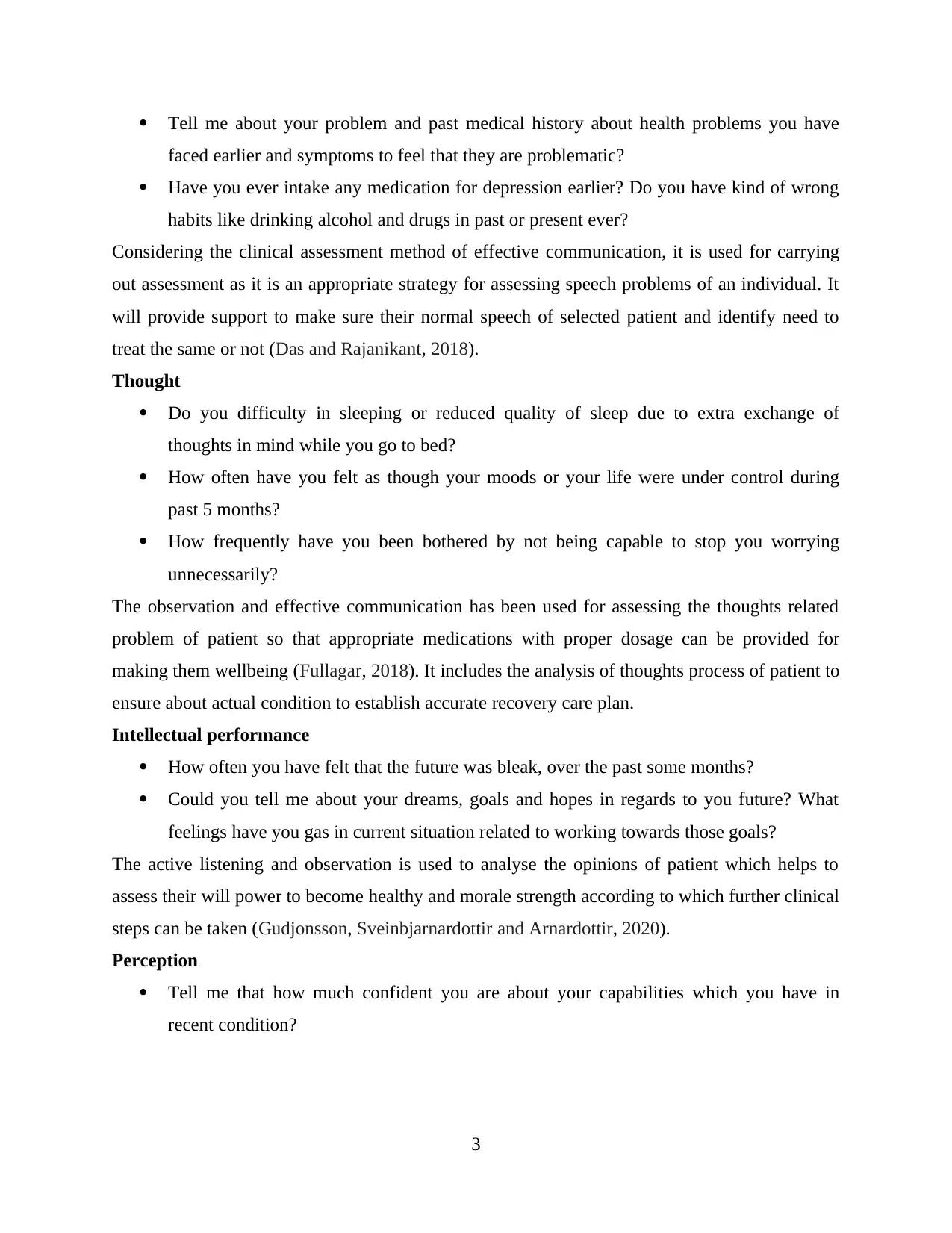
Tell me about your problem and past medical history about health problems you have
faced earlier and symptoms to feel that they are problematic?
Have you ever intake any medication for depression earlier? Do you have kind of wrong
habits like drinking alcohol and drugs in past or present ever?
Considering the clinical assessment method of effective communication, it is used for carrying
out assessment as it is an appropriate strategy for assessing speech problems of an individual. It
will provide support to make sure their normal speech of selected patient and identify need to
treat the same or not (Das and Rajanikant, 2018).
Thought
Do you difficulty in sleeping or reduced quality of sleep due to extra exchange of
thoughts in mind while you go to bed?
How often have you felt as though your moods or your life were under control during
past 5 months?
How frequently have you been bothered by not being capable to stop you worrying
unnecessarily?
The observation and effective communication has been used for assessing the thoughts related
problem of patient so that appropriate medications with proper dosage can be provided for
making them wellbeing (Fullagar, 2018). It includes the analysis of thoughts process of patient to
ensure about actual condition to establish accurate recovery care plan.
Intellectual performance
How often you have felt that the future was bleak, over the past some months?
Could you tell me about your dreams, goals and hopes in regards to you future? What
feelings have you gas in current situation related to working towards those goals?
The active listening and observation is used to analyse the opinions of patient which helps to
assess their will power to become healthy and morale strength according to which further clinical
steps can be taken (Gudjonsson, Sveinbjarnardottir and Arnardottir, 2020).
Perception
Tell me that how much confident you are about your capabilities which you have in
recent condition?
3
faced earlier and symptoms to feel that they are problematic?
Have you ever intake any medication for depression earlier? Do you have kind of wrong
habits like drinking alcohol and drugs in past or present ever?
Considering the clinical assessment method of effective communication, it is used for carrying
out assessment as it is an appropriate strategy for assessing speech problems of an individual. It
will provide support to make sure their normal speech of selected patient and identify need to
treat the same or not (Das and Rajanikant, 2018).
Thought
Do you difficulty in sleeping or reduced quality of sleep due to extra exchange of
thoughts in mind while you go to bed?
How often have you felt as though your moods or your life were under control during
past 5 months?
How frequently have you been bothered by not being capable to stop you worrying
unnecessarily?
The observation and effective communication has been used for assessing the thoughts related
problem of patient so that appropriate medications with proper dosage can be provided for
making them wellbeing (Fullagar, 2018). It includes the analysis of thoughts process of patient to
ensure about actual condition to establish accurate recovery care plan.
Intellectual performance
How often you have felt that the future was bleak, over the past some months?
Could you tell me about your dreams, goals and hopes in regards to you future? What
feelings have you gas in current situation related to working towards those goals?
The active listening and observation is used to analyse the opinions of patient which helps to
assess their will power to become healthy and morale strength according to which further clinical
steps can be taken (Gudjonsson, Sveinbjarnardottir and Arnardottir, 2020).
Perception
Tell me that how much confident you are about your capabilities which you have in
recent condition?
3
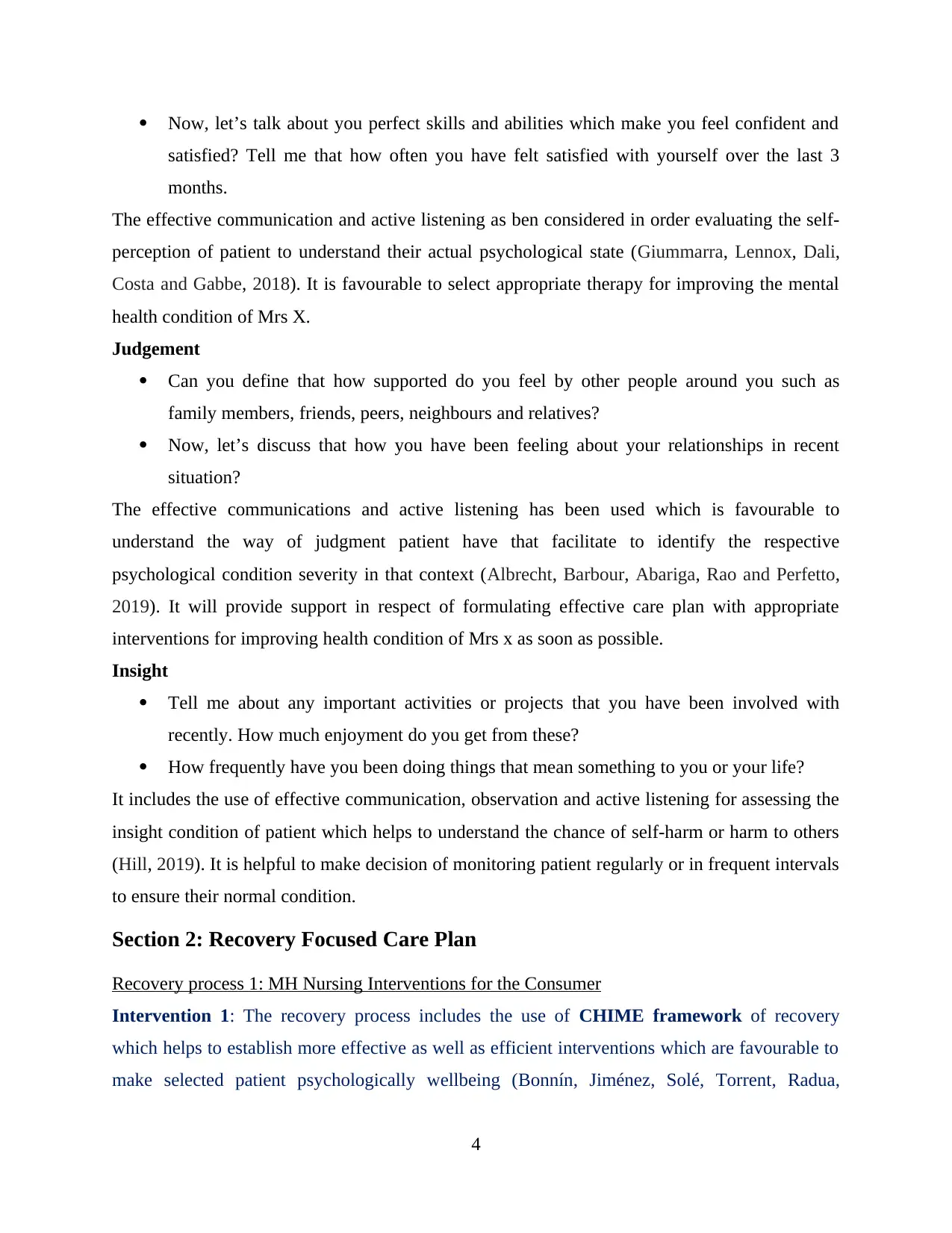
Now, let’s talk about you perfect skills and abilities which make you feel confident and
satisfied? Tell me that how often you have felt satisfied with yourself over the last 3
months.
The effective communication and active listening as ben considered in order evaluating the self-
perception of patient to understand their actual psychological state (Giummarra, Lennox, Dali,
Costa and Gabbe, 2018). It is favourable to select appropriate therapy for improving the mental
health condition of Mrs X.
Judgement
Can you define that how supported do you feel by other people around you such as
family members, friends, peers, neighbours and relatives?
Now, let’s discuss that how you have been feeling about your relationships in recent
situation?
The effective communications and active listening has been used which is favourable to
understand the way of judgment patient have that facilitate to identify the respective
psychological condition severity in that context (Albrecht, Barbour, Abariga, Rao and Perfetto,
2019). It will provide support in respect of formulating effective care plan with appropriate
interventions for improving health condition of Mrs x as soon as possible.
Insight
Tell me about any important activities or projects that you have been involved with
recently. How much enjoyment do you get from these?
How frequently have you been doing things that mean something to you or your life?
It includes the use of effective communication, observation and active listening for assessing the
insight condition of patient which helps to understand the chance of self-harm or harm to others
(Hill, 2019). It is helpful to make decision of monitoring patient regularly or in frequent intervals
to ensure their normal condition.
Section 2: Recovery Focused Care Plan
Recovery process 1: MH Nursing Interventions for the Consumer
Intervention 1: The recovery process includes the use of CHIME framework of recovery
which helps to establish more effective as well as efficient interventions which are favourable to
make selected patient psychologically wellbeing (Bonnín, Jiménez, Solé, Torrent, Radua,
4
satisfied? Tell me that how often you have felt satisfied with yourself over the last 3
months.
The effective communication and active listening as ben considered in order evaluating the self-
perception of patient to understand their actual psychological state (Giummarra, Lennox, Dali,
Costa and Gabbe, 2018). It is favourable to select appropriate therapy for improving the mental
health condition of Mrs X.
Judgement
Can you define that how supported do you feel by other people around you such as
family members, friends, peers, neighbours and relatives?
Now, let’s discuss that how you have been feeling about your relationships in recent
situation?
The effective communications and active listening has been used which is favourable to
understand the way of judgment patient have that facilitate to identify the respective
psychological condition severity in that context (Albrecht, Barbour, Abariga, Rao and Perfetto,
2019). It will provide support in respect of formulating effective care plan with appropriate
interventions for improving health condition of Mrs x as soon as possible.
Insight
Tell me about any important activities or projects that you have been involved with
recently. How much enjoyment do you get from these?
How frequently have you been doing things that mean something to you or your life?
It includes the use of effective communication, observation and active listening for assessing the
insight condition of patient which helps to understand the chance of self-harm or harm to others
(Hill, 2019). It is helpful to make decision of monitoring patient regularly or in frequent intervals
to ensure their normal condition.
Section 2: Recovery Focused Care Plan
Recovery process 1: MH Nursing Interventions for the Consumer
Intervention 1: The recovery process includes the use of CHIME framework of recovery
which helps to establish more effective as well as efficient interventions which are favourable to
make selected patient psychologically wellbeing (Bonnín, Jiménez, Solé, Torrent, Radua,
4
⊘ This is a preview!⊘
Do you want full access?
Subscribe today to unlock all pages.

Trusted by 1+ million students worldwide
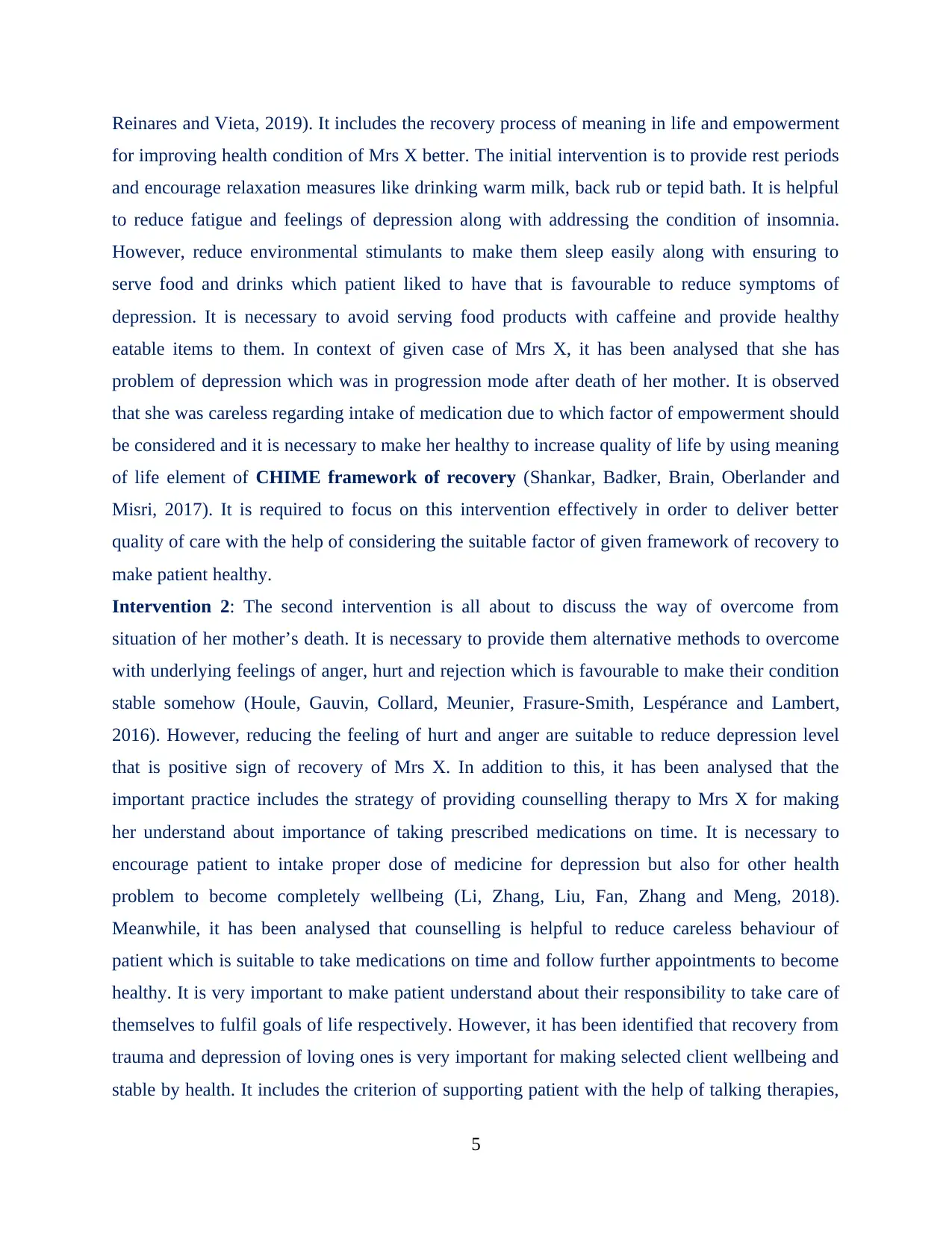
Reinares and Vieta, 2019). It includes the recovery process of meaning in life and empowerment
for improving health condition of Mrs X better. The initial intervention is to provide rest periods
and encourage relaxation measures like drinking warm milk, back rub or tepid bath. It is helpful
to reduce fatigue and feelings of depression along with addressing the condition of insomnia.
However, reduce environmental stimulants to make them sleep easily along with ensuring to
serve food and drinks which patient liked to have that is favourable to reduce symptoms of
depression. It is necessary to avoid serving food products with caffeine and provide healthy
eatable items to them. In context of given case of Mrs X, it has been analysed that she has
problem of depression which was in progression mode after death of her mother. It is observed
that she was careless regarding intake of medication due to which factor of empowerment should
be considered and it is necessary to make her healthy to increase quality of life by using meaning
of life element of CHIME framework of recovery (Shankar, Badker, Brain, Oberlander and
Misri, 2017). It is required to focus on this intervention effectively in order to deliver better
quality of care with the help of considering the suitable factor of given framework of recovery to
make patient healthy.
Intervention 2: The second intervention is all about to discuss the way of overcome from
situation of her mother’s death. It is necessary to provide them alternative methods to overcome
with underlying feelings of anger, hurt and rejection which is favourable to make their condition
stable somehow (Houle, Gauvin, Collard, Meunier, Frasure-Smith, Lespérance and Lambert,
2016). However, reducing the feeling of hurt and anger are suitable to reduce depression level
that is positive sign of recovery of Mrs X. In addition to this, it has been analysed that the
important practice includes the strategy of providing counselling therapy to Mrs X for making
her understand about importance of taking prescribed medications on time. It is necessary to
encourage patient to intake proper dose of medicine for depression but also for other health
problem to become completely wellbeing (Li, Zhang, Liu, Fan, Zhang and Meng, 2018).
Meanwhile, it has been analysed that counselling is helpful to reduce careless behaviour of
patient which is suitable to take medications on time and follow further appointments to become
healthy. It is very important to make patient understand about their responsibility to take care of
themselves to fulfil goals of life respectively. However, it has been identified that recovery from
trauma and depression of loving ones is very important for making selected client wellbeing and
stable by health. It includes the criterion of supporting patient with the help of talking therapies,
5
for improving health condition of Mrs X better. The initial intervention is to provide rest periods
and encourage relaxation measures like drinking warm milk, back rub or tepid bath. It is helpful
to reduce fatigue and feelings of depression along with addressing the condition of insomnia.
However, reduce environmental stimulants to make them sleep easily along with ensuring to
serve food and drinks which patient liked to have that is favourable to reduce symptoms of
depression. It is necessary to avoid serving food products with caffeine and provide healthy
eatable items to them. In context of given case of Mrs X, it has been analysed that she has
problem of depression which was in progression mode after death of her mother. It is observed
that she was careless regarding intake of medication due to which factor of empowerment should
be considered and it is necessary to make her healthy to increase quality of life by using meaning
of life element of CHIME framework of recovery (Shankar, Badker, Brain, Oberlander and
Misri, 2017). It is required to focus on this intervention effectively in order to deliver better
quality of care with the help of considering the suitable factor of given framework of recovery to
make patient healthy.
Intervention 2: The second intervention is all about to discuss the way of overcome from
situation of her mother’s death. It is necessary to provide them alternative methods to overcome
with underlying feelings of anger, hurt and rejection which is favourable to make their condition
stable somehow (Houle, Gauvin, Collard, Meunier, Frasure-Smith, Lespérance and Lambert,
2016). However, reducing the feeling of hurt and anger are suitable to reduce depression level
that is positive sign of recovery of Mrs X. In addition to this, it has been analysed that the
important practice includes the strategy of providing counselling therapy to Mrs X for making
her understand about importance of taking prescribed medications on time. It is necessary to
encourage patient to intake proper dose of medicine for depression but also for other health
problem to become completely wellbeing (Li, Zhang, Liu, Fan, Zhang and Meng, 2018).
Meanwhile, it has been analysed that counselling is helpful to reduce careless behaviour of
patient which is suitable to take medications on time and follow further appointments to become
healthy. It is very important to make patient understand about their responsibility to take care of
themselves to fulfil goals of life respectively. However, it has been identified that recovery from
trauma and depression of loving ones is very important for making selected client wellbeing and
stable by health. It includes the criterion of supporting patient with the help of talking therapies,
5
Paraphrase This Document
Need a fresh take? Get an instant paraphrase of this document with our AI Paraphraser
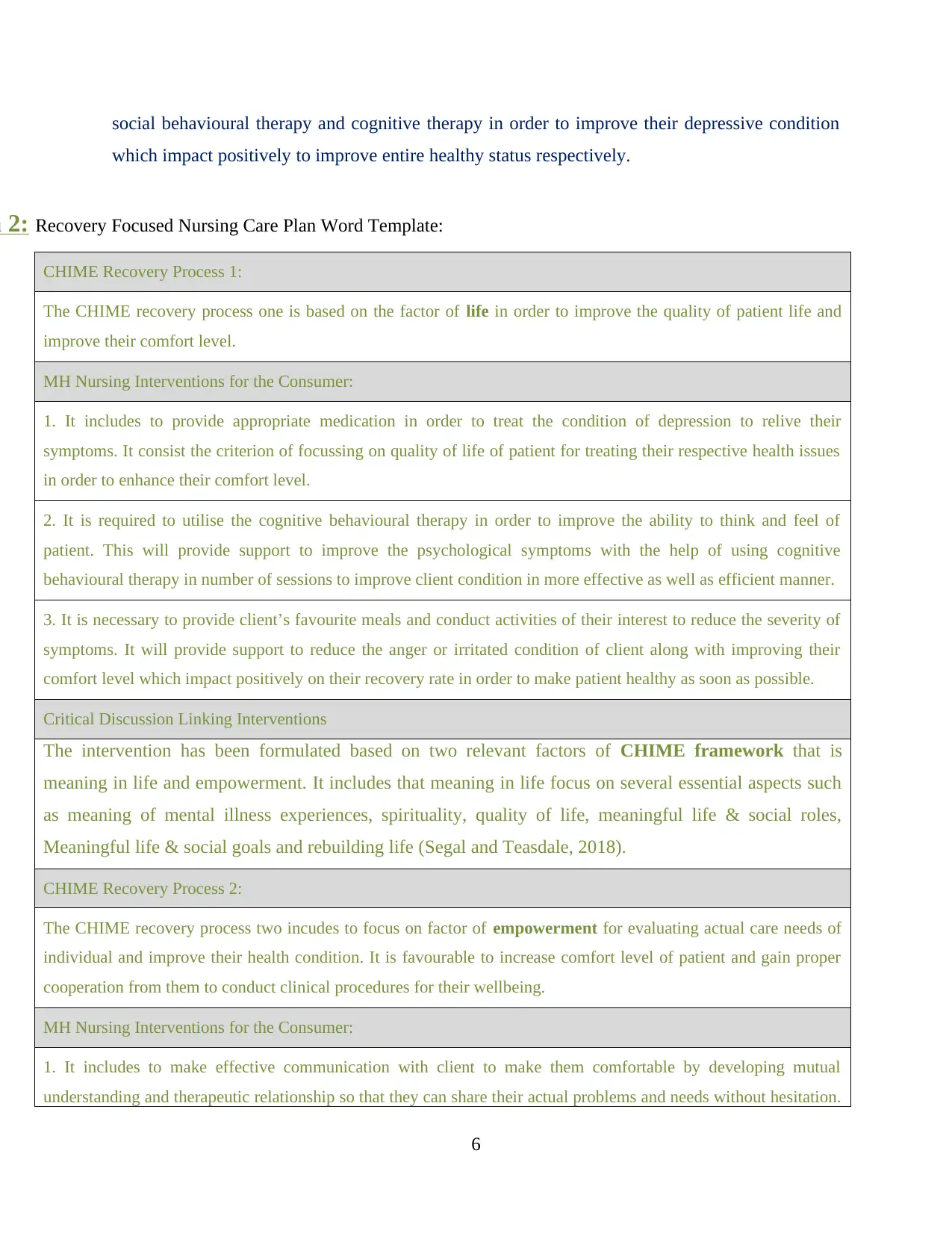
social behavioural therapy and cognitive therapy in order to improve their depressive condition
which impact positively to improve entire healthy status respectively.
n 2: Recovery Focused Nursing Care Plan Word Template:
CHIME Recovery Process 1:
The CHIME recovery process one is based on the factor of life in order to improve the quality of patient life and
improve their comfort level.
MH Nursing Interventions for the Consumer:
1. It includes to provide appropriate medication in order to treat the condition of depression to relive their
symptoms. It consist the criterion of focussing on quality of life of patient for treating their respective health issues
in order to enhance their comfort level.
2. It is required to utilise the cognitive behavioural therapy in order to improve the ability to think and feel of
patient. This will provide support to improve the psychological symptoms with the help of using cognitive
behavioural therapy in number of sessions to improve client condition in more effective as well as efficient manner.
3. It is necessary to provide client’s favourite meals and conduct activities of their interest to reduce the severity of
symptoms. It will provide support to reduce the anger or irritated condition of client along with improving their
comfort level which impact positively on their recovery rate in order to make patient healthy as soon as possible.
Critical Discussion Linking Interventions
The intervention has been formulated based on two relevant factors of CHIME framework that is
meaning in life and empowerment. It includes that meaning in life focus on several essential aspects such
as meaning of mental illness experiences, spirituality, quality of life, meaningful life & social roles,
Meaningful life & social goals and rebuilding life (Segal and Teasdale, 2018).
CHIME Recovery Process 2:
The CHIME recovery process two incudes to focus on factor of empowerment for evaluating actual care needs of
individual and improve their health condition. It is favourable to increase comfort level of patient and gain proper
cooperation from them to conduct clinical procedures for their wellbeing.
MH Nursing Interventions for the Consumer:
1. It includes to make effective communication with client to make them comfortable by developing mutual
understanding and therapeutic relationship so that they can share their actual problems and needs without hesitation.
6
which impact positively to improve entire healthy status respectively.
n 2: Recovery Focused Nursing Care Plan Word Template:
CHIME Recovery Process 1:
The CHIME recovery process one is based on the factor of life in order to improve the quality of patient life and
improve their comfort level.
MH Nursing Interventions for the Consumer:
1. It includes to provide appropriate medication in order to treat the condition of depression to relive their
symptoms. It consist the criterion of focussing on quality of life of patient for treating their respective health issues
in order to enhance their comfort level.
2. It is required to utilise the cognitive behavioural therapy in order to improve the ability to think and feel of
patient. This will provide support to improve the psychological symptoms with the help of using cognitive
behavioural therapy in number of sessions to improve client condition in more effective as well as efficient manner.
3. It is necessary to provide client’s favourite meals and conduct activities of their interest to reduce the severity of
symptoms. It will provide support to reduce the anger or irritated condition of client along with improving their
comfort level which impact positively on their recovery rate in order to make patient healthy as soon as possible.
Critical Discussion Linking Interventions
The intervention has been formulated based on two relevant factors of CHIME framework that is
meaning in life and empowerment. It includes that meaning in life focus on several essential aspects such
as meaning of mental illness experiences, spirituality, quality of life, meaningful life & social roles,
Meaningful life & social goals and rebuilding life (Segal and Teasdale, 2018).
CHIME Recovery Process 2:
The CHIME recovery process two incudes to focus on factor of empowerment for evaluating actual care needs of
individual and improve their health condition. It is favourable to increase comfort level of patient and gain proper
cooperation from them to conduct clinical procedures for their wellbeing.
MH Nursing Interventions for the Consumer:
1. It includes to make effective communication with client to make them comfortable by developing mutual
understanding and therapeutic relationship so that they can share their actual problems and needs without hesitation.
6
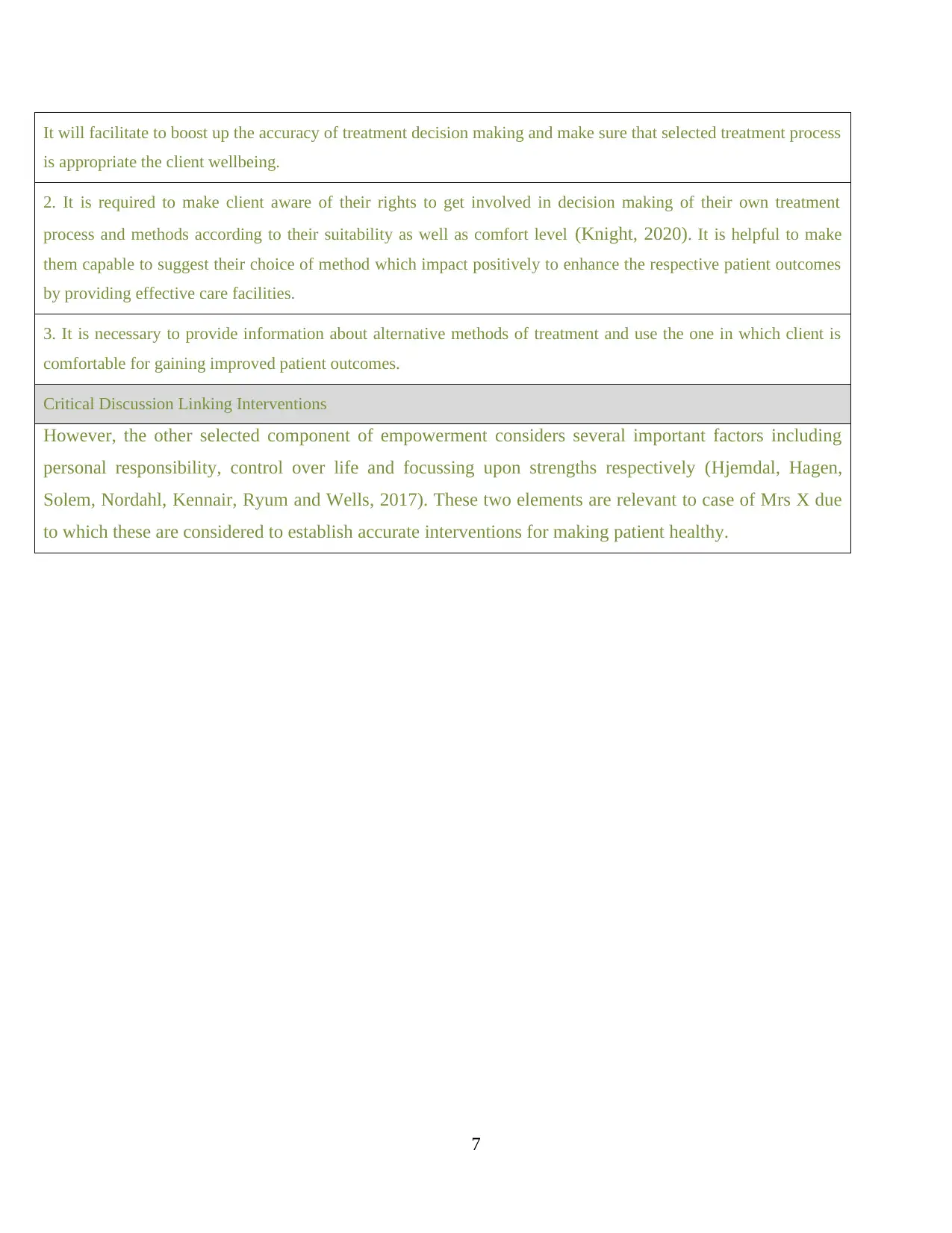
It will facilitate to boost up the accuracy of treatment decision making and make sure that selected treatment process
is appropriate the client wellbeing.
2. It is required to make client aware of their rights to get involved in decision making of their own treatment
process and methods according to their suitability as well as comfort level (Knight, 2020). It is helpful to make
them capable to suggest their choice of method which impact positively to enhance the respective patient outcomes
by providing effective care facilities.
3. It is necessary to provide information about alternative methods of treatment and use the one in which client is
comfortable for gaining improved patient outcomes.
Critical Discussion Linking Interventions
However, the other selected component of empowerment considers several important factors including
personal responsibility, control over life and focussing upon strengths respectively (Hjemdal, Hagen,
Solem, Nordahl, Kennair, Ryum and Wells, 2017). These two elements are relevant to case of Mrs X due
to which these are considered to establish accurate interventions for making patient healthy.
7
is appropriate the client wellbeing.
2. It is required to make client aware of their rights to get involved in decision making of their own treatment
process and methods according to their suitability as well as comfort level (Knight, 2020). It is helpful to make
them capable to suggest their choice of method which impact positively to enhance the respective patient outcomes
by providing effective care facilities.
3. It is necessary to provide information about alternative methods of treatment and use the one in which client is
comfortable for gaining improved patient outcomes.
Critical Discussion Linking Interventions
However, the other selected component of empowerment considers several important factors including
personal responsibility, control over life and focussing upon strengths respectively (Hjemdal, Hagen,
Solem, Nordahl, Kennair, Ryum and Wells, 2017). These two elements are relevant to case of Mrs X due
to which these are considered to establish accurate interventions for making patient healthy.
7
⊘ This is a preview!⊘
Do you want full access?
Subscribe today to unlock all pages.

Trusted by 1+ million students worldwide
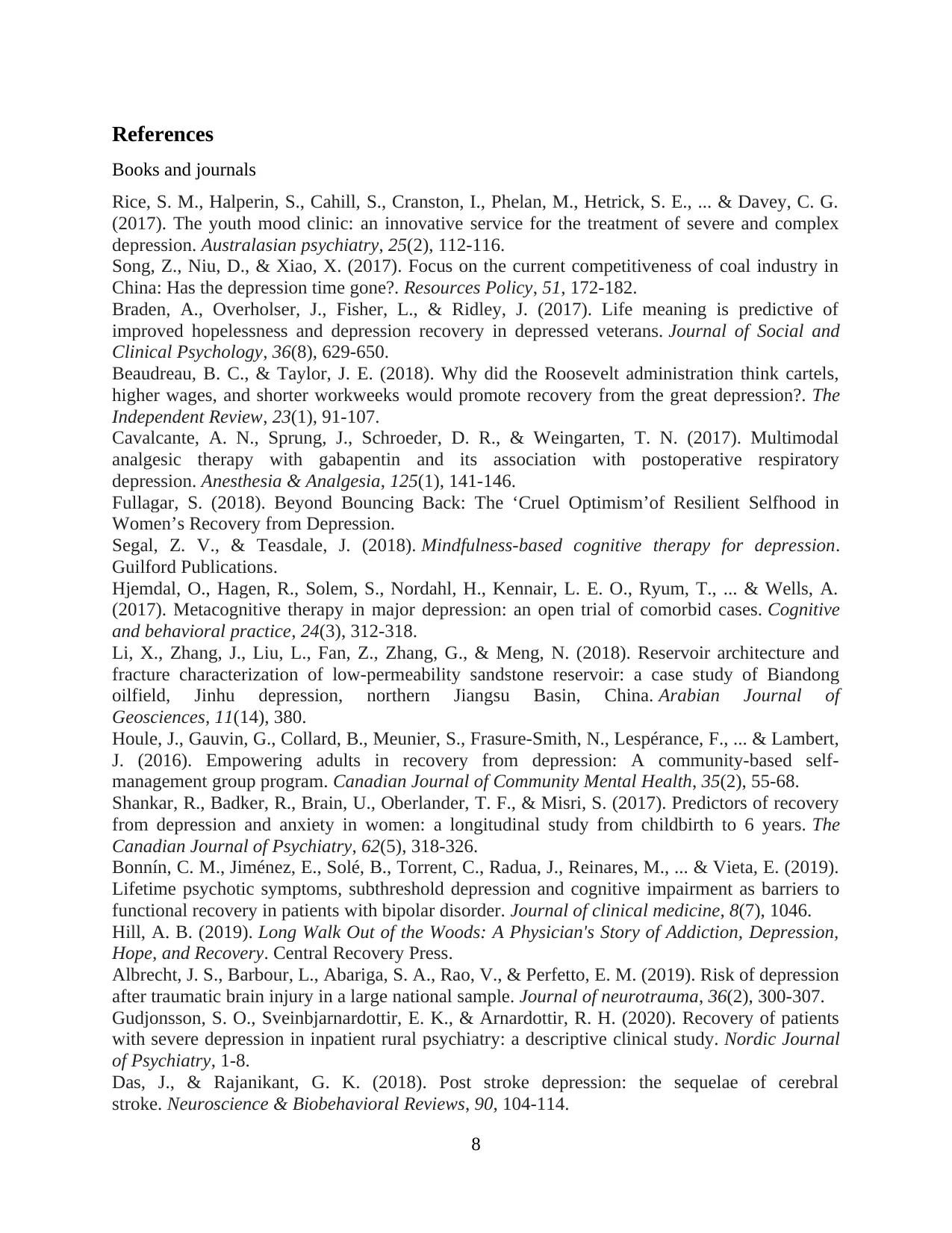
References
Books and journals
Rice, S. M., Halperin, S., Cahill, S., Cranston, I., Phelan, M., Hetrick, S. E., ... & Davey, C. G.
(2017). The youth mood clinic: an innovative service for the treatment of severe and complex
depression. Australasian psychiatry, 25(2), 112-116.
Song, Z., Niu, D., & Xiao, X. (2017). Focus on the current competitiveness of coal industry in
China: Has the depression time gone?. Resources Policy, 51, 172-182.
Braden, A., Overholser, J., Fisher, L., & Ridley, J. (2017). Life meaning is predictive of
improved hopelessness and depression recovery in depressed veterans. Journal of Social and
Clinical Psychology, 36(8), 629-650.
Beaudreau, B. C., & Taylor, J. E. (2018). Why did the Roosevelt administration think cartels,
higher wages, and shorter workweeks would promote recovery from the great depression?. The
Independent Review, 23(1), 91-107.
Cavalcante, A. N., Sprung, J., Schroeder, D. R., & Weingarten, T. N. (2017). Multimodal
analgesic therapy with gabapentin and its association with postoperative respiratory
depression. Anesthesia & Analgesia, 125(1), 141-146.
Fullagar, S. (2018). Beyond Bouncing Back: The ‘Cruel Optimism’of Resilient Selfhood in
Women’s Recovery from Depression.
Segal, Z. V., & Teasdale, J. (2018). Mindfulness-based cognitive therapy for depression.
Guilford Publications.
Hjemdal, O., Hagen, R., Solem, S., Nordahl, H., Kennair, L. E. O., Ryum, T., ... & Wells, A.
(2017). Metacognitive therapy in major depression: an open trial of comorbid cases. Cognitive
and behavioral practice, 24(3), 312-318.
Li, X., Zhang, J., Liu, L., Fan, Z., Zhang, G., & Meng, N. (2018). Reservoir architecture and
fracture characterization of low-permeability sandstone reservoir: a case study of Biandong
oilfield, Jinhu depression, northern Jiangsu Basin, China. Arabian Journal of
Geosciences, 11(14), 380.
Houle, J., Gauvin, G., Collard, B., Meunier, S., Frasure-Smith, N., Lespérance, F., ... & Lambert,
J. (2016). Empowering adults in recovery from depression: A community-based self-
management group program. Canadian Journal of Community Mental Health, 35(2), 55-68.
Shankar, R., Badker, R., Brain, U., Oberlander, T. F., & Misri, S. (2017). Predictors of recovery
from depression and anxiety in women: a longitudinal study from childbirth to 6 years. The
Canadian Journal of Psychiatry, 62(5), 318-326.
Bonnín, C. M., Jiménez, E., Solé, B., Torrent, C., Radua, J., Reinares, M., ... & Vieta, E. (2019).
Lifetime psychotic symptoms, subthreshold depression and cognitive impairment as barriers to
functional recovery in patients with bipolar disorder. Journal of clinical medicine, 8(7), 1046.
Hill, A. B. (2019). Long Walk Out of the Woods: A Physician's Story of Addiction, Depression,
Hope, and Recovery. Central Recovery Press.
Albrecht, J. S., Barbour, L., Abariga, S. A., Rao, V., & Perfetto, E. M. (2019). Risk of depression
after traumatic brain injury in a large national sample. Journal of neurotrauma, 36(2), 300-307.
Gudjonsson, S. O., Sveinbjarnardottir, E. K., & Arnardottir, R. H. (2020). Recovery of patients
with severe depression in inpatient rural psychiatry: a descriptive clinical study. Nordic Journal
of Psychiatry, 1-8.
Das, J., & Rajanikant, G. K. (2018). Post stroke depression: the sequelae of cerebral
stroke. Neuroscience & Biobehavioral Reviews, 90, 104-114.
8
Books and journals
Rice, S. M., Halperin, S., Cahill, S., Cranston, I., Phelan, M., Hetrick, S. E., ... & Davey, C. G.
(2017). The youth mood clinic: an innovative service for the treatment of severe and complex
depression. Australasian psychiatry, 25(2), 112-116.
Song, Z., Niu, D., & Xiao, X. (2017). Focus on the current competitiveness of coal industry in
China: Has the depression time gone?. Resources Policy, 51, 172-182.
Braden, A., Overholser, J., Fisher, L., & Ridley, J. (2017). Life meaning is predictive of
improved hopelessness and depression recovery in depressed veterans. Journal of Social and
Clinical Psychology, 36(8), 629-650.
Beaudreau, B. C., & Taylor, J. E. (2018). Why did the Roosevelt administration think cartels,
higher wages, and shorter workweeks would promote recovery from the great depression?. The
Independent Review, 23(1), 91-107.
Cavalcante, A. N., Sprung, J., Schroeder, D. R., & Weingarten, T. N. (2017). Multimodal
analgesic therapy with gabapentin and its association with postoperative respiratory
depression. Anesthesia & Analgesia, 125(1), 141-146.
Fullagar, S. (2018). Beyond Bouncing Back: The ‘Cruel Optimism’of Resilient Selfhood in
Women’s Recovery from Depression.
Segal, Z. V., & Teasdale, J. (2018). Mindfulness-based cognitive therapy for depression.
Guilford Publications.
Hjemdal, O., Hagen, R., Solem, S., Nordahl, H., Kennair, L. E. O., Ryum, T., ... & Wells, A.
(2017). Metacognitive therapy in major depression: an open trial of comorbid cases. Cognitive
and behavioral practice, 24(3), 312-318.
Li, X., Zhang, J., Liu, L., Fan, Z., Zhang, G., & Meng, N. (2018). Reservoir architecture and
fracture characterization of low-permeability sandstone reservoir: a case study of Biandong
oilfield, Jinhu depression, northern Jiangsu Basin, China. Arabian Journal of
Geosciences, 11(14), 380.
Houle, J., Gauvin, G., Collard, B., Meunier, S., Frasure-Smith, N., Lespérance, F., ... & Lambert,
J. (2016). Empowering adults in recovery from depression: A community-based self-
management group program. Canadian Journal of Community Mental Health, 35(2), 55-68.
Shankar, R., Badker, R., Brain, U., Oberlander, T. F., & Misri, S. (2017). Predictors of recovery
from depression and anxiety in women: a longitudinal study from childbirth to 6 years. The
Canadian Journal of Psychiatry, 62(5), 318-326.
Bonnín, C. M., Jiménez, E., Solé, B., Torrent, C., Radua, J., Reinares, M., ... & Vieta, E. (2019).
Lifetime psychotic symptoms, subthreshold depression and cognitive impairment as barriers to
functional recovery in patients with bipolar disorder. Journal of clinical medicine, 8(7), 1046.
Hill, A. B. (2019). Long Walk Out of the Woods: A Physician's Story of Addiction, Depression,
Hope, and Recovery. Central Recovery Press.
Albrecht, J. S., Barbour, L., Abariga, S. A., Rao, V., & Perfetto, E. M. (2019). Risk of depression
after traumatic brain injury in a large national sample. Journal of neurotrauma, 36(2), 300-307.
Gudjonsson, S. O., Sveinbjarnardottir, E. K., & Arnardottir, R. H. (2020). Recovery of patients
with severe depression in inpatient rural psychiatry: a descriptive clinical study. Nordic Journal
of Psychiatry, 1-8.
Das, J., & Rajanikant, G. K. (2018). Post stroke depression: the sequelae of cerebral
stroke. Neuroscience & Biobehavioral Reviews, 90, 104-114.
8
Paraphrase This Document
Need a fresh take? Get an instant paraphrase of this document with our AI Paraphraser
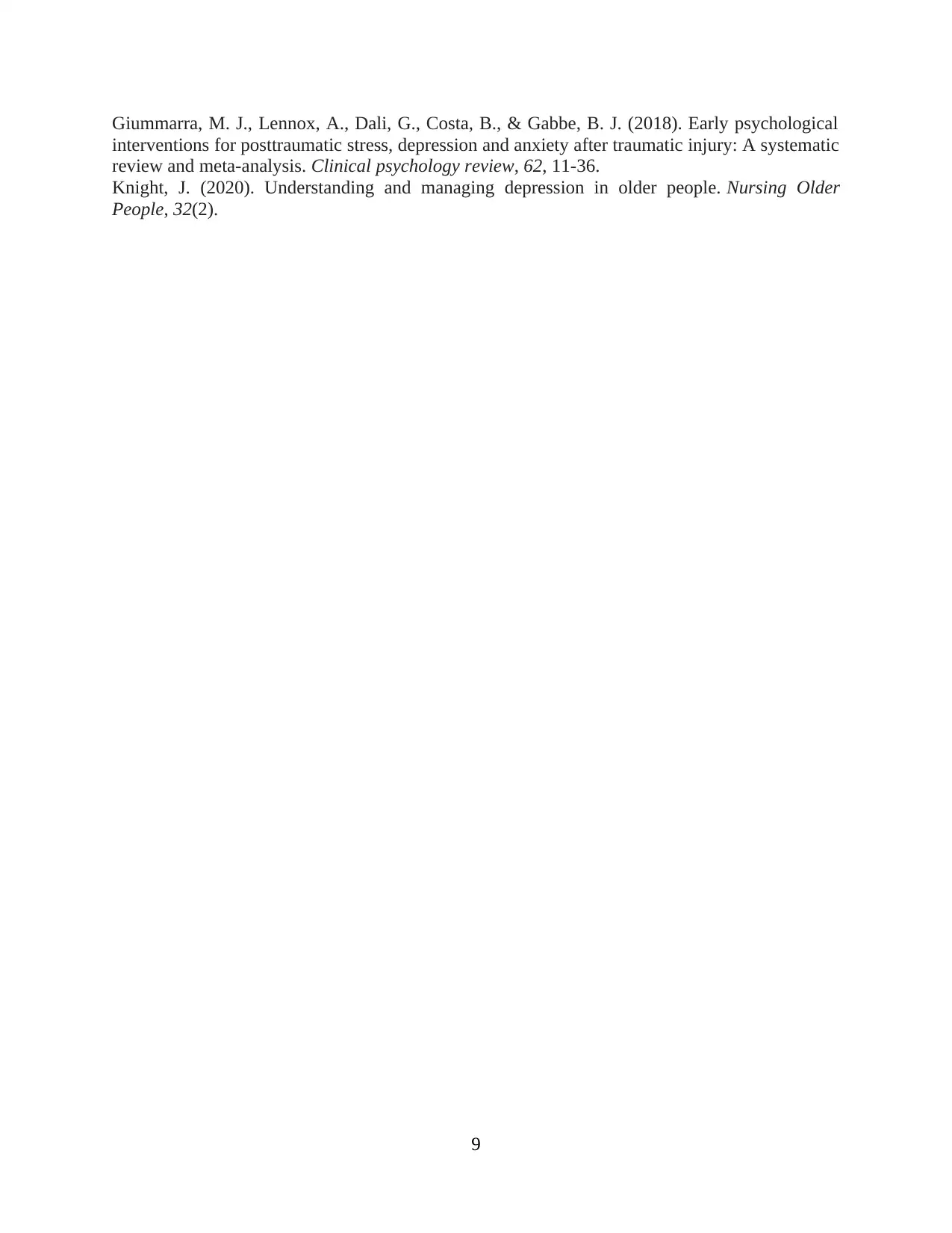
Giummarra, M. J., Lennox, A., Dali, G., Costa, B., & Gabbe, B. J. (2018). Early psychological
interventions for posttraumatic stress, depression and anxiety after traumatic injury: A systematic
review and meta-analysis. Clinical psychology review, 62, 11-36.
Knight, J. (2020). Understanding and managing depression in older people. Nursing Older
People, 32(2).
9
interventions for posttraumatic stress, depression and anxiety after traumatic injury: A systematic
review and meta-analysis. Clinical psychology review, 62, 11-36.
Knight, J. (2020). Understanding and managing depression in older people. Nursing Older
People, 32(2).
9
1 out of 11
Related Documents
Your All-in-One AI-Powered Toolkit for Academic Success.
+13062052269
info@desklib.com
Available 24*7 on WhatsApp / Email
![[object Object]](/_next/static/media/star-bottom.7253800d.svg)
Unlock your academic potential
Copyright © 2020–2026 A2Z Services. All Rights Reserved. Developed and managed by ZUCOL.





